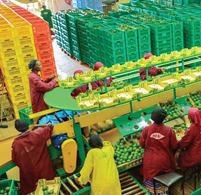Kenya’s growing importance as a global hub for trade explains why the nation has been experiencing the fastest rise in foreign direct investment in the continent.
Thrust on perishables exports According to a recent report, Kenya earned much more from flower and other perishable exports in the last three years than before. “The earnings from exports are slowly growing and a promise of a better future.
A number of multinational freight forwarders are acquiring Kenyan companies to tap into the lucrative perishables market. Recently, the world’s third largest logistics company, Japan’s Nippon Express, launched a subsidiary office in Kenya. Nippon Express has been making use of local agents for the export of home-grown (Kenyan) cut flowers and roses.
The firm announced that it will be putting in place a structure to meet the needs of customers in Kenya and the rest of East Africa, where sustained growth is expected.

 Kenya’s cut-flower industry may be set to grow once again with direct flights opening in October to the United States. Kenya’s flower growers have been anticipating the direct flights for a few years now, according to Clement Tulezi., CEO Kenya Flower Council. Kenya’s cut-flower industry has blossomed since the 1980s, and now holds the biggest market share for exports to Europe. Kenya’s flower producers are hoping direct flights set to open between Nairobi and New York City could help them put down roots in a new market — the United States.
Kenya’s cut-flower industry may be set to grow once again with direct flights opening in October to the United States. Kenya’s flower growers have been anticipating the direct flights for a few years now, according to Clement Tulezi., CEO Kenya Flower Council. Kenya’s cut-flower industry has blossomed since the 1980s, and now holds the biggest market share for exports to Europe. Kenya’s flower producers are hoping direct flights set to open between Nairobi and New York City could help them put down roots in a new market — the United States. Kenya’s flower industry is adopting high-quality standards to grow and consolidate its market share and ward off competition from emerging flower-growing countries in an increasingly competitive global market. The internationally and locally defined quality standards are geared towards creating the Kenyan flower brand.The standards include the Kenya Flower Council Silver standard which all exporters must comply to. The KS1758 standard for flowers and ornamentals is an additional quality control measure, “which means no one should be allowed to mess up the industry.”
Kenya’s flower industry is adopting high-quality standards to grow and consolidate its market share and ward off competition from emerging flower-growing countries in an increasingly competitive global market. The internationally and locally defined quality standards are geared towards creating the Kenyan flower brand.The standards include the Kenya Flower Council Silver standard which all exporters must comply to. The KS1758 standard for flowers and ornamentals is an additional quality control measure, “which means no one should be allowed to mess up the industry.” Building a brand marketing strategy doesn’t happen overnight. You have start somewhere. So what is the first step you should take in creating your marketing strategy? Where should you start?
Building a brand marketing strategy doesn’t happen overnight. You have start somewhere. So what is the first step you should take in creating your marketing strategy? Where should you start? 